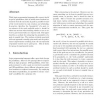30 search results - page 1 / 6 » Compile-Time Analysis and Specialization of Clocks in Concur... |
CC
2009
Springer
14 years 8 months ago
2009
Springer
Abstract. Clocks are a mechanism for providing synchronization barriers in concurrent programming languages. They are usually implemented using primitive communication mechanisms a...
POPL
2007
ACM
14 years 7 months ago
2007
ACM
Concurrent ML (CML) is a statically-typed higher-order concurrent language that is embedded in Standard ML. Its most notable feature is its support for first-class synchronous ope...
PLDI
1990
ACM
13 years 11 months ago
1990
ACM
While logic programming languages offer a great deal of scope for parallelism, there is usually some overhead associated with the execution of goals in parallel because of the wor...
APLAS
2004
ACM
14 years 27 days ago
2004
ACM
Abstract. In component-based programming, the programmer assembles applications from prefabricated components. The assembly process has two main steps: adapting a component by twea...
EMSOFT
2005
Springer
14 years 1 months ago
2005
Springer
We describe a system as a set of communicating concurrent programs. Quasi-static scheduling compiles the concurrent programs into a sequential one. It uses a Petri net as an inter...

